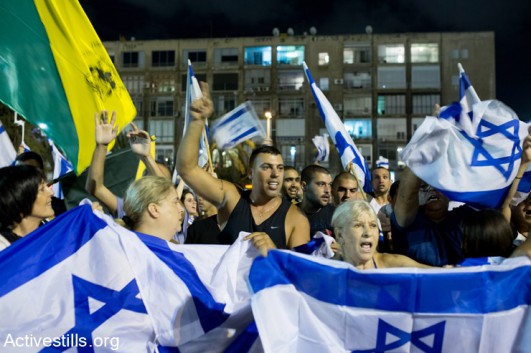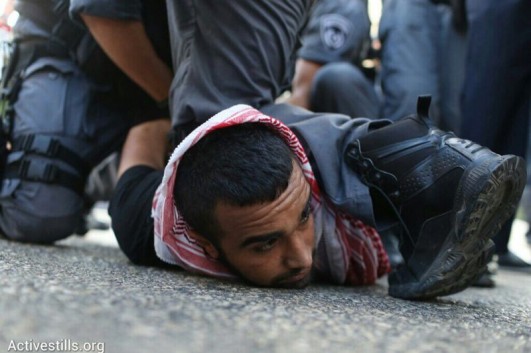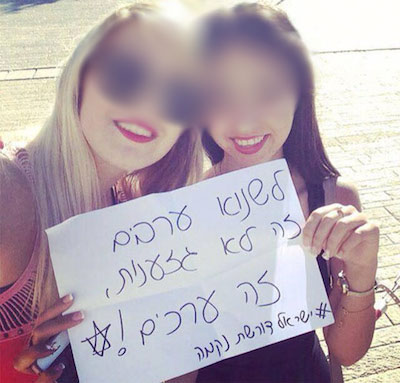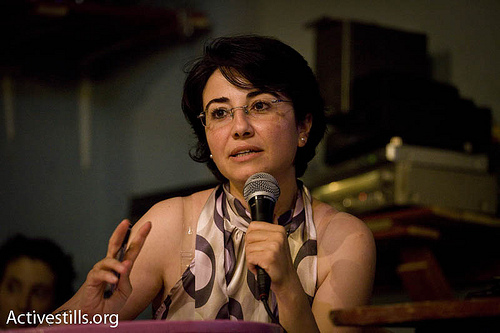Beyond an unprecedented degree of destruction in Gaza, Israel’s latest offensive on the Strip brought with it unrivaled levels of racism and incitement back home.
By Elizabeth Tsurkov
The war between Israel and Palestinian armed groups in Gaza would appear as the latest round of fighting between Israel and Hamas; however, this war was different from previous rounds of fighting on both sides. The level of destruction in Gaza was unprecedented, while in Israel anti-democratic and racist forces gained much more prominence and influence compared to previous wars.
As in all other nations during times of war, the Israeli public rallies around the flag. Differences that once mattered – class, proximity to Gaza, and even opinions on the economy and the Israeli-Palestinian conflict – disappear almost entirely.
The escalation between Israel and Hamas followed the kidnapping of three Israeli teens in the occupied West Bank. The teens were kidnapped, apparently by a Hamas cell from Hebron, and executed shortly after. The IDF launched Operation Brother’s Keeper, supposedly to track down the missing boys. Although the Israeli military and leadership knew fairly early on that the teens had probably been murdered, the Israeli public was not informed. The search for the teens turned into an operation to dismantle what was left of the civilian outreach infrastructure of Hamas in the West Bank.

Declaring war on all Palestinians
Following the murder of the teens, Israeli politicians, including the prime minister himself, called for “revenge.” Members of the religious nationalistic Jewish Home party, which had gained about 60% in approval ratings during the operation, called for “recouping the blood of the teens, an eye for an eye” and all-out war on the Palestinians. A far-right member of Netanyahu’s party, MK Moshe Feiglin, called to reoccupy Gaza and ethnically cleanse it of Palestinians by placing them in tent camps and then expelling them to other countries.
Israel has been under the rule of right-wing governments headed by Prime Minister Netanyahu since 2009. During this time, such incitement became much more common, while the peace process ground to a halt and settlement expansion shot through the roof. Incitement against Palestinian citizens of Israel also spiked, with Foreign Minister Avigdor Lieberman basing entire election campaigns on painting them as disloyal.
At the same time, groups of mostly young settlers began operating in the West Bank, targeting Palestinian homes, fields, private property and mosques. The groups at first limited their “price tag” attacks to the West Bank, but then spread to Israel as well – private homes, churches and mosques were vandalized and desecrated. Israeli security forces have arrested only a few of the perpetrators, further emboldening them.
The military’s mouthpiece
For its part, Israeli media had a role to play in the violent atmosphere. As with previous IDF operations, all mainstream media outlets in Israel, except the liberal daily Haaretz, unquestionably accepted as fact claims made the IDF, and expressed full support for the war. Israeli media covered what happened in Gaza through the lens of the Israeli soldier – what was bombed and how many terrorists were killed. The narrative presented by the Israeli media was that we Israelis are the victims, while Hamas is the aggressor. The voices of the population suffering the most due to the war – the civilians in Gaza – were not heard in Israeli media, except in Haaretz, which is read by only 5% of Israelis.

By and large, Israeli mainstream media does not discuss Israel’s responsibility for the deaths and suffering of innocents in Gaza. Information that contradicts IDF claims about civilian casualties is hidden or not mentioned at all. Mass deaths of civilians such as the bombings of entire families inside their homes or bombardment of UNRWA schools where thousands of Gazans had taken shelter are framed as harmful to Israel’s international image.
Israeli journalists see their role as maintaining the nation’s morale in times of war. To that end, Israeli journalists practice self-censorship and don’t report on anything that may lead Israelis to think that their army is ill-prepared for war or that it is not the most moral army in the world. Reports about logistical and operational problems and errors began emerging only once the war was practically over. Israelis are not interested in receiving information that contradicts their worldview. Ironically, Israelis who want Gaza to be “flattened” and “hit hard” are not exposed to images of the IDF doing just that. This perpetuates a cycle of violence, since Israelis continue to feel that we haven’t hit the Palestinians hard enough. Both times that Netanyahu called for a ceasefire he faced opposition by most Jewish Israelis, according to polls [Hebrew].
Unprecedented incitement
Thanks to the years of government incitement against Palestinians inside Israel and in the occupied territories, the media’s full support for all IDF actions and the almost-unhindered rampages of “price tag” gangs, the public atmosphere during this war was different. The unique aspect was the direct – and at times literal – assault on free speech and dissent. The threats to free speech came from politicians, academic institutions, police and vigilante mobs.
The main victims of the contraction of space for dissent in Israel during the war were, of course, Palestinian citizens of Israel. Members of Knesset who represent the Arab minority (about 20% of the Israeli population) were thrown out of parliament hearings for daring to oppose the war. MK Hanin Zoabi (Balad party) was even barred from plenum discussions for the next six months – the harshest punishment ever placed on an MK by the Knesset Ethics Committee.
The number of hate crimes against Palestinians skyrocketed, as did the ferocity of the attacks. Shortly after the bodies of the three Israeli teens were found, Jewish Israelis kidnapped Palestinian teen Mohammed Abu Khdeir from his home in East Jerusalem, beat him, forced him to drink gasoline and set him on fire while he was still alive. Another Jewish mob nearly killed two Palestinians in East Jerusalem three weeks ago.
Jewish leftists were subjected to attacks as well. The violence against anti-war protesters was organized and systematic, as never before in Israel. Almost all anti-war protests in Tel Aviv and Haifa ended in violence, mostly by right-wing gangs largely made up of teens who attacked the protesters. At other times, the violence came from the police, which dispersed protesters without any legal basis.
Vitriol on social media
The counter protests to the anti-war rallies were organized on social media and WhatsApp. Numerous Facebook pages calling for “revenge” and vigilante attacks against Arabs popped up during the war. These pages gave racist Israelis the sense that they were part of a mass movement, increasing their confidence and willingness to resort to violence against Jewish Israelis too. The far-right protesters felt comfortable adding the “Death to leftists” chant to the regular repertoire of “Death to Arabs” and songs against the Prophet Muhammad.
Facebook was also used to hunt down “traitors” – Arab citizens of Israel and leftists who opposed the war. The posts and private information of the “traitors” was posted on those pages, and followers were urged to call the “traitors’” employers to get them fired. Dozens of Arab Israelis and leftists lost their jobs as a result. Not one Israeli who called for genocide of Arabs on social media was fired.
In the realm of academia, the bastion of progressive thought in Israel, suppression of dissent was also strongly evident. Both Tel Aviv and Ben Gurion universities sent out letters to their students warning them against posting inflammatory comments on social media. Bar Ilan University publicly backed Dr. Mordechai Kedar, who teaches at the institution and called for the rape of sisters and wives of Palestinian suicide bombers to deter Palestinians from such attacks. Weeks later the university ordered a lecturer who expressed sympathy to people harmed by the war in Israel and Gaza to apologize.

A facade of ‘unity’
The Jewish Israeli public and media rarely oppose IDF operations, and this war was no exception. However, the long-term trends of government incitement, coupled with the sense of impunity of “Price Tag” gangs and the ability to organize into mobs using social media, resulted in an unprecedented climate of fear inside Israel. This war was clearly a turning point for free speech and Arab-Israeli coexistence in Israel. Hate speech and even hate crimes are not addressed seriously, and that’s not surprising given that the incitement comes from the top, too.
Instead of praising the unity and solidarity of the ‘people of Israel’ in times of war, Israeli government officials would do better to stop inciting against those who are excluded from or choose not to take part in the wave of militarism and violent nationalism that has gripped Israel over the past weeks.
Elizabeth Tsurkov works at the Hotline for Refugees and Migrants, an Israeli human rights NGO, and can be followed on Twitter.
Related:
Propaganda war: Searching for a narrative in Operation Protective Edge
Not just escalation: A frightening new era of Jewish-Arab relations in Israel
Why Palestinian citizens of Israel are no longer safe

